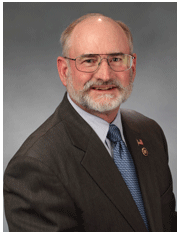JEFFERSON CITY, Mo. — When Missouri voters approved a one-eighth-cent sales tax to fund the Missouri Department of Conversation in 1976, they may not have realized just how big the department could become. And as the department continues to grow, Missouri lawmakers are increasingly clashing with it over the rules, regulations, and financial operations of Missouri’s massive conservation operation.
Thanks to the dedicated revenue, Missouri’s Department of Conservation is one of the largest and most formidable in the nation, with a budget approaching $150 million for the coming year.
The Department issued a “legislative alert” during last week’s Missouri Natural Resources Conference at the Lake of the Ozarks. The update names nearly a dozen bills filed in the Missouri legislature that the Department says would “gut” their services.
–SJR 1, a bill from Sen. Brian Munzlinger, would remake the Conversation Commission, which oversees the Department. Munzlinger’s bill would change the terms of service and have commissioners selected to various “regions” throughout the state to advocate for specific needs of their constituents. Department officials called it a “blatant attempt to politicize” the body.
Munzlinger scoffed at the idea that his bill was a drastic change for the Commission.
“I’m not changing their mission,” Munzlinger said. “They are to represent the whole state. But they will be from different

conservation regions. As diverse as Missouri is, it can be very important when different issues come up. Northeast Missouri hasn’t had someone on the Commission in more than 35 years.”
–SB 56, a bill from Munzlinger that eliminates all hunting, fishing and trapping permit fees in the state.
–SB 178, another Munzlinger bill likely to reignite last year’s debate about captive cervids. The bill would designate captive deer as livestock, thus placing their control and regulation under the control of the Missouri Department of Agriculture. The Department of Conservation strongly opposes the measure.
“It could be a new meat market for Missouri,” Munzlinger said. “Even Governor Nixon is calling on an increase in beef production. There is a potential for a new meat market with deer. The only way to do that is to allow captive cervids to be classified as livestock. Only livestock can be inspected and only inspected meat can be sold. Just like elk, which is classified as livestock and allows them to have a meat market.”
–HJR 27 and 28, both filed by Rep. Bryan Spencer, are aimed squarely at the dedicated conservation sales tax. Spencer’s first resolution would halve the tax to one-sixteenth of one cent. The second would sunset the tax unless renewed by Missouri’s voters.
Department officials howled that the tax was already small — Missourians pay $12.50 to Conservation for every $10,000 spent on taxable goods — and that nearly every single service and program would suffer as the result of such a budget slash.
“Since 1976, the department has not been accountable to the people in any way, shape or form,” Spencer said. “Bringing the issue of the sales tax to the people is the perfect time for people to say that conservation is doing a great job, we want to continue to fund them at that level. [The department] should want this bill.”
Spencer chided the department for giving raises to top officials while leaving field worker’s salaries stagnant.
“They have roughly $70 million in an investment account,” Spencer said. “They’ve given top management a 17 percent pay raise while the rest of the field agents did not receive such a raise. There are some questions that deal with the amount of money spent on animals that have been eradicated since the 1800’s.”
Spencer was referring to a 2013 audit of the department that showed they spent $3.4 million to bring 129 elk from Kentucky to reintroduce to Missouri.
Deputy Director of the Department of Conversation, Tim Ripperger, said that number was not an accurate reflection of the program cost. Ripperger said the department opposed a sunset or a reduction in their budget because the people of Missouri have long supported the organization.

“We’re not hearing citizens come to us and say we need to change,” Ripperger said. “Twice in our history the citizens of Missouri have taken a conservation initiative on their shoulders because they felt it was the right thing to do. We see no need to undo what the people wanted.”
But wait, there’s more. Among the bills drawing ire from the Department are three from Rep. Wanda Brown. Brown’s bills would require all deceased deer found on Missouri highways to be tested for Chronic Wasting Disease, requires Conservation Commission members to register as lobbyists and follow all related rules and regulations, and would require the department to reimburse Missouri drivers that strike deer up to $500 each.
Brown isn’t alone. Rep. Robert Ross is taking issue with the department’s acquisition of land and clear cutting of “huge” swaths of timber forest. Ross said he supports logging and the timber industry, but that the department’s attempt to “rejuvenate” is going to cripple the industry for generations.
“There’s an issue when you have a state agency that seems to have an insatiable appetite to spend your tax dollars to buy land and immediately begin clear cutting it,” Ross said. “I’m not against logging. It’s a major industry in my area. But what the department is doing is not good stewardship of those resources.”
Ross recently filed HB’s 833 and 834. HB833 would flatly prohibit “clear cutting” and establish the “Forestry Management Consortium” to implement and prescribe management of state-owned forestland. The bill would require the department to follow the consortium’s recommendations “without variance.” HB834 would prohibit the department from purchasing or receiving donated land without legislative approval. Ross additionally filed a joint resolution that, if approved by voters, would require legislative approval for any land purchased by the department.
“I’m an individual that believes with every fiber of my being in the mission of conservation, in the very definition of the word,” Ross said. “But we have a state agency that’s run awry of their 1930’s creation.”
Ross noted that land bought by the department doesn’t ultimately produce revenue for local communities that private ownership would generate.
Munzlinger echoed Ross’ concerns about the department buying up large chunks of land.
“I think they own enough land,” Munzlinger said. “They own about 800,000 acres and manage another 200,000. That’s more than 1 million acres of land and it’s not even including the DNR state parks. There’s a lot of publicly owned land in Missouri.”
Several lawmakers with legislation aimed at the department complained to The Missouri Times about the department’s lack of response to basic questions about budget, rules promulgation, and more.
“If they were transparent, there wouldn’t be any of these bills,” Spencer said.
“It’s like pulling teeth,” Munzlinger said.
“As someone who sat through their budget hearing, I can say they are the most arrogant agency to come before the legislature to discuss their budget priorities,” Ross said.
Ripperger flatly contradicted that characterization, saying that transparency is a “hallmark” of the department.

“We’re willing to sit down with anyone, citizen or lawmaker, and discuss any aspect of our budget,” Ripperger said. “I can’t speak to these individual concerns or allegations. What I can tell you is this: our budget and expenditures are published once a year in our magazine, the Conservationist. That magazine goes to more than half a million households. Over the last few years we’ve had 40 internal and external audits, none of which have found fraud or any wrongdoing. We are transparent and we’d be glad to sit down with anyone who thinks we’re not.”
Spencer said he initially began the process hoping to help the department in any way he could, calling himself a “strong advocate” for many of their practices. But Spencer said stonewalling, and the occasional whiff of nefarious financial practices have made it very difficult to give the department the benefit of the doubt.
Munzlinger referred repeatedly to the department’s “arrogance” in dealing with legislators, saying they often gave the impression that “they knew best.”
“I’m a big fan of a lot of the things they’ve done,” Munzlinger said. “But I do think some issues have stirred some animosity in the legislature whether it’s the department’s arrogance or a single agent, here in the building or back home with a constituent. I wouldn’t say that there’s a lot of “anti” department of conservation bills. But a lot has changed since its inception.”





